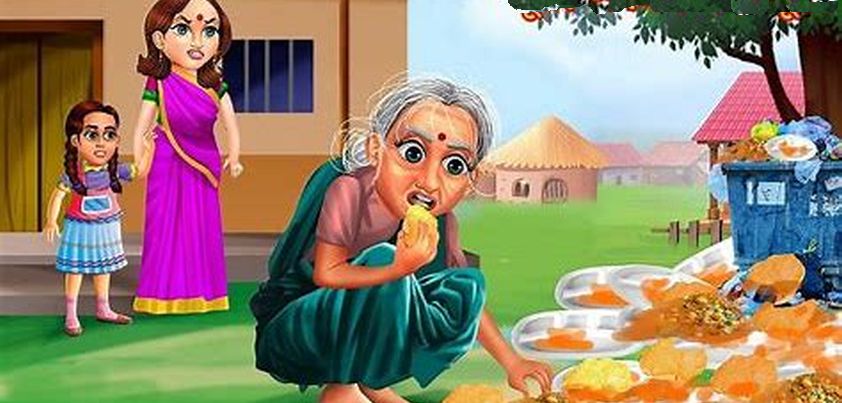 In this story by Premchand a Hindu woman is overcome with pity and fear of adharma (divine punishment for selfishness and injustice) when she sees her husband’s disabled aunt foraging for food among banquet leftovers. The aunt, who has no other living relative, had previously transferred her entire property to the woman’s family in exchange for a promise of care. Rather than being cared for she has been treated inhumanely, often being left hungry and alone in her room for long periods. Themes include greed, betrayal, the plight of the infirm, responsibility, neglect, redemption, kindness. More…
In this story by Premchand a Hindu woman is overcome with pity and fear of adharma (divine punishment for selfishness and injustice) when she sees her husband’s disabled aunt foraging for food among banquet leftovers. The aunt, who has no other living relative, had previously transferred her entire property to the woman’s family in exchange for a promise of care. Rather than being cared for she has been treated inhumanely, often being left hungry and alone in her room for long periods. Themes include greed, betrayal, the plight of the infirm, responsibility, neglect, redemption, kindness. More…
Archives
Big Brother / Bade Bhai Sahab
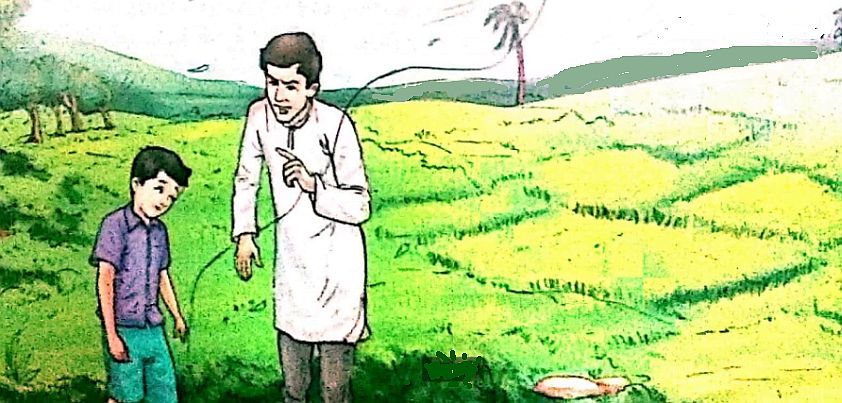 This story by Premchand contrasts two Indian bothers attending boarding school. The older (by five years) is studious, disciplined, serious about his responsibility to look after and guide his younger brother, and consistently fails his grade. The younger brother is the opposite: fun-loving, undisciplined, irresponsible, and consistently tops his class. The major messages of the story are the danger of arrogant pride, and that irrespective of one’s level of education, there is always something to learn from those with more life experience. Themes include education, self-discipline, responsibility, pride, work/life balance, respect for one’s elders. More…
This story by Premchand contrasts two Indian bothers attending boarding school. The older (by five years) is studious, disciplined, serious about his responsibility to look after and guide his younger brother, and consistently fails his grade. The younger brother is the opposite: fun-loving, undisciplined, irresponsible, and consistently tops his class. The major messages of the story are the danger of arrogant pride, and that irrespective of one’s level of education, there is always something to learn from those with more life experience. Themes include education, self-discipline, responsibility, pride, work/life balance, respect for one’s elders. More…
The Salt Inspector / Namak Ka Daroga
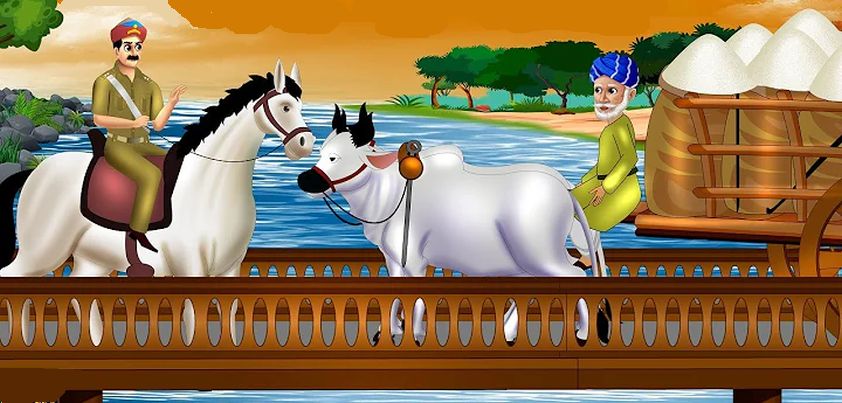 This parable by Premchand about an incorruptible Indian tax inspector ends with a moral dilemma. The idealistic young man refuses a huge bribe and arrests a wealthy zamindar (land baron) for smuggling salt. Because of his “connections”, the zamindar walks free and the inspector is suspended for being over-zealous. Shortly afterwards, the clever zamindar offers the young man a highly-paid job overseeing his properties. He seems happy to cheat the government, but needs someone honest to stop people cheating him. The young man’s dilemma: should he work for such a person? Themes include individual and systemic corruption, integrity, moral compromise. More…
This parable by Premchand about an incorruptible Indian tax inspector ends with a moral dilemma. The idealistic young man refuses a huge bribe and arrests a wealthy zamindar (land baron) for smuggling salt. Because of his “connections”, the zamindar walks free and the inspector is suspended for being over-zealous. Shortly afterwards, the clever zamindar offers the young man a highly-paid job overseeing his properties. He seems happy to cheat the government, but needs someone honest to stop people cheating him. The young man’s dilemma: should he work for such a person? Themes include individual and systemic corruption, integrity, moral compromise. More…
Festival of Eid / Idgah
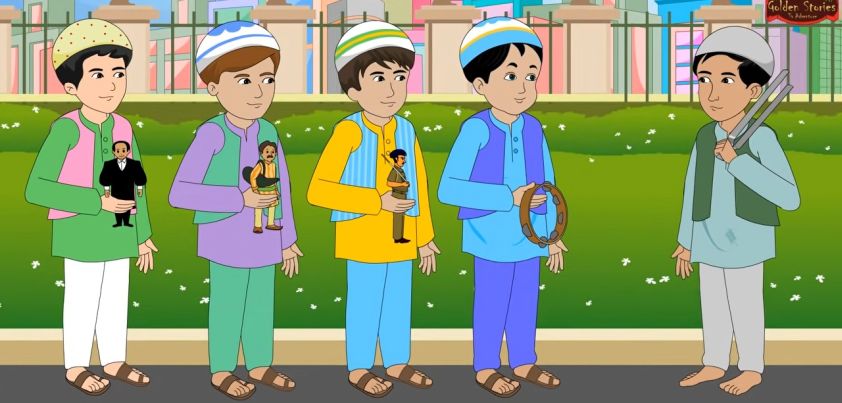 In this well-known Indian children’s story from Premchand, a young orphan foregoes the pleasures enjoyed by friends at a festival to buy a pair of tongs to prevent his poverty-stricken grandmother from burning her hands when cooking. The most obvious themes are related to the boy: poverty, innocence, hope, love, selflessness, temptation and willpower. However, at around 5,000 words, the story also highlights several additional issues. The boy’s friends display materialism and greed, while other themes include religious devotion, superstition (Jinns), village vs. city life and, through the fate of the dolls, the fall of British colonialism. More…
In this well-known Indian children’s story from Premchand, a young orphan foregoes the pleasures enjoyed by friends at a festival to buy a pair of tongs to prevent his poverty-stricken grandmother from burning her hands when cooking. The most obvious themes are related to the boy: poverty, innocence, hope, love, selflessness, temptation and willpower. However, at around 5,000 words, the story also highlights several additional issues. The boy’s friends display materialism and greed, while other themes include religious devotion, superstition (Jinns), village vs. city life and, through the fate of the dolls, the fall of British colonialism. More…
The Thakur’s Well / Thakur Ka Kuan
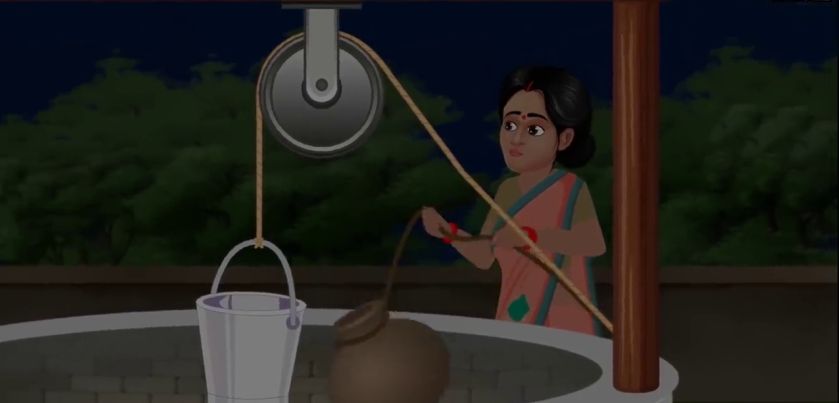 This poignant story by Premchand highlights the degrading treatment of Dalits (untouchables) under India’s caste system.A woman brings water for her sick husband from the only well in the village available to Dalits. It is contaminated and has a foul smell. She doesn’t know that boiling will purify the water, and decides that her only option is to risk a severe beating by secretly drawing water from the well of the high-caste Thakur, who forbids low-caste villagers from using it. Themes include social class, discrimination, poverty, courage, gender roles, corruption of the upper classes. More…
This poignant story by Premchand highlights the degrading treatment of Dalits (untouchables) under India’s caste system.A woman brings water for her sick husband from the only well in the village available to Dalits. It is contaminated and has a foul smell. She doesn’t know that boiling will purify the water, and decides that her only option is to risk a severe beating by secretly drawing water from the well of the high-caste Thakur, who forbids low-caste villagers from using it. Themes include social class, discrimination, poverty, courage, gender roles, corruption of the upper classes. More…
The Voice of God / Holy Panchayat
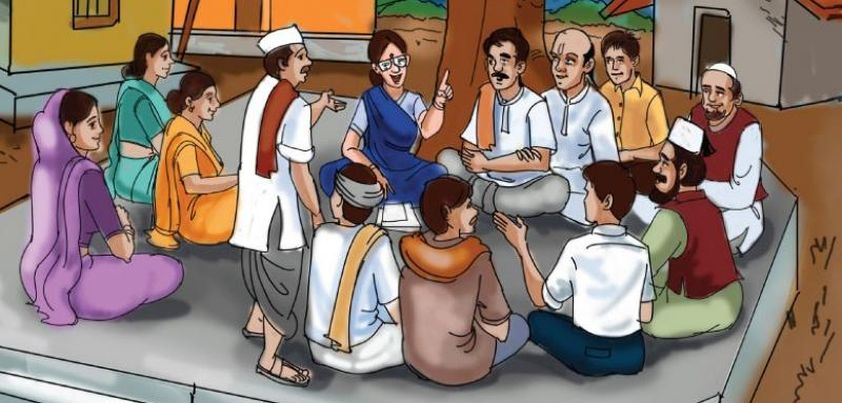 The major theme of this story by Premchand is justice. Two men who have been close friends since childhood fall out when one rules against the other in a dispute over the treatment of an aged aunt at the village Panchayat (council of elders). The roles are later reversed when the aggrieved friend, who still holds a grudge against the other, has to judge a complaint against him about a bullock he sold. Their rift is resolved when he sees that in dispensing justice, one must put personal feelings and friendships aside. Other themes include tradition, friendship, responsibility, impartiality. More…
The major theme of this story by Premchand is justice. Two men who have been close friends since childhood fall out when one rules against the other in a dispute over the treatment of an aged aunt at the village Panchayat (council of elders). The roles are later reversed when the aggrieved friend, who still holds a grudge against the other, has to judge a complaint against him about a bullock he sold. Their rift is resolved when he sees that in dispensing justice, one must put personal feelings and friendships aside. Other themes include tradition, friendship, responsibility, impartiality. More…
The Tale of the Two Oxen / Do Bailon Ki Katha
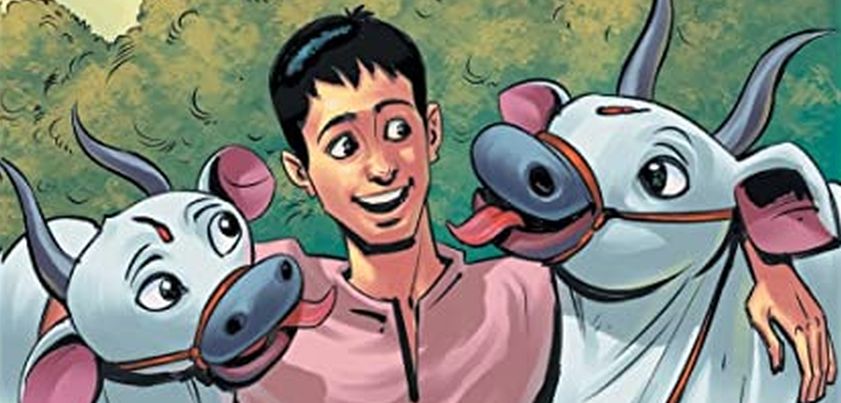 This story by Premchand has three important themes: kindness to animals, friendship and faith. A series of adventures begin for two oxen (Hira and Moti) when Jhuri, their much-loved owner, lends them to his wife’s brother who lives far away. The brother-in-law mistreats the poor animals and, with the help of a kind girl, they run away. Their friendship gives them the strength to endure an attack by a raging bull, beatings and starvation before being sold to a butcher. As they almost lose hope and begin to question their faith in god, a ‘miracle’ helps them return home. More…
This story by Premchand has three important themes: kindness to animals, friendship and faith. A series of adventures begin for two oxen (Hira and Moti) when Jhuri, their much-loved owner, lends them to his wife’s brother who lives far away. The brother-in-law mistreats the poor animals and, with the help of a kind girl, they run away. Their friendship gives them the strength to endure an attack by a raging bull, beatings and starvation before being sold to a butcher. As they almost lose hope and begin to question their faith in god, a ‘miracle’ helps them return home. More…
A January Night / Poos Ki Raat
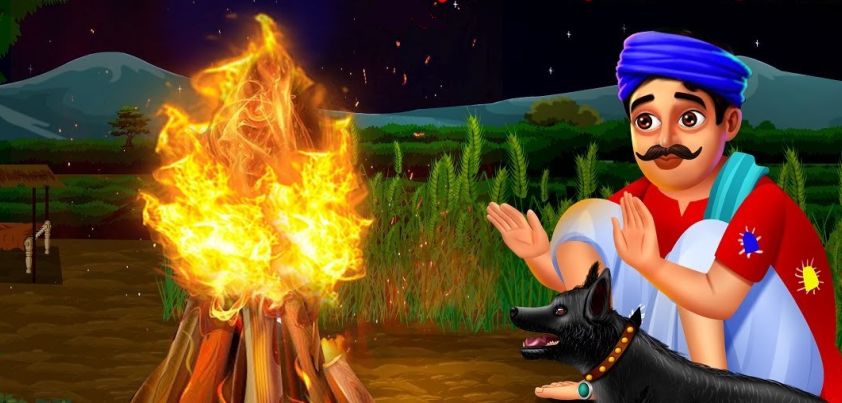 This story by Premchand highlights the plight of tenant farmers in pre-Independence India. In the Hindu calendar, the month of Poos (mid-December to mid-January) marks the beginning of winter. A farmer, forced to pay his debts with money he had saved to buy a blanket, watches over his crops one night in freezing temperatures. With his loyal dog beside him, he manages to survive the night. Unfortunately, his crops do not. His wife is devastated, but he is happy. Themes include the powerlessness and exploitation of tenant farmers, poverty, struggle, the harshness of nature, resilience. More…
This story by Premchand highlights the plight of tenant farmers in pre-Independence India. In the Hindu calendar, the month of Poos (mid-December to mid-January) marks the beginning of winter. A farmer, forced to pay his debts with money he had saved to buy a blanket, watches over his crops one night in freezing temperatures. With his loyal dog beside him, he manages to survive the night. Unfortunately, his crops do not. His wife is devastated, but he is happy. Themes include the powerlessness and exploitation of tenant farmers, poverty, struggle, the harshness of nature, resilience. More…
The Shroud / Kafan
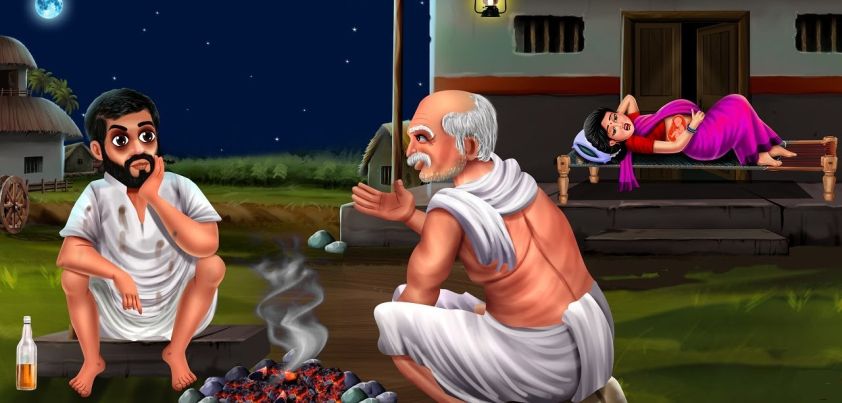 This dark comedy by Premchand follows father and son Chamars (one of the Dalit or “untouchable” sub-castes) as they go to buy a funeral shroud for the son’s deceased wife. The lazy but likeable pair, who will do anything to shirk work, end up spending donated shroud money on a boozy night in town. The story satirizes the caste system by pointing out that those who can never rise above their low birth position have little incentive to do more than ensure their survival. Themes include social class, callousness, indolence, tradition, selfishness, exploitation (of the generosity of others). More…
This dark comedy by Premchand follows father and son Chamars (one of the Dalit or “untouchable” sub-castes) as they go to buy a funeral shroud for the son’s deceased wife. The lazy but likeable pair, who will do anything to shirk work, end up spending donated shroud money on a boozy night in town. The story satirizes the caste system by pointing out that those who can never rise above their low birth position have little incentive to do more than ensure their survival. Themes include social class, callousness, indolence, tradition, selfishness, exploitation (of the generosity of others). More…